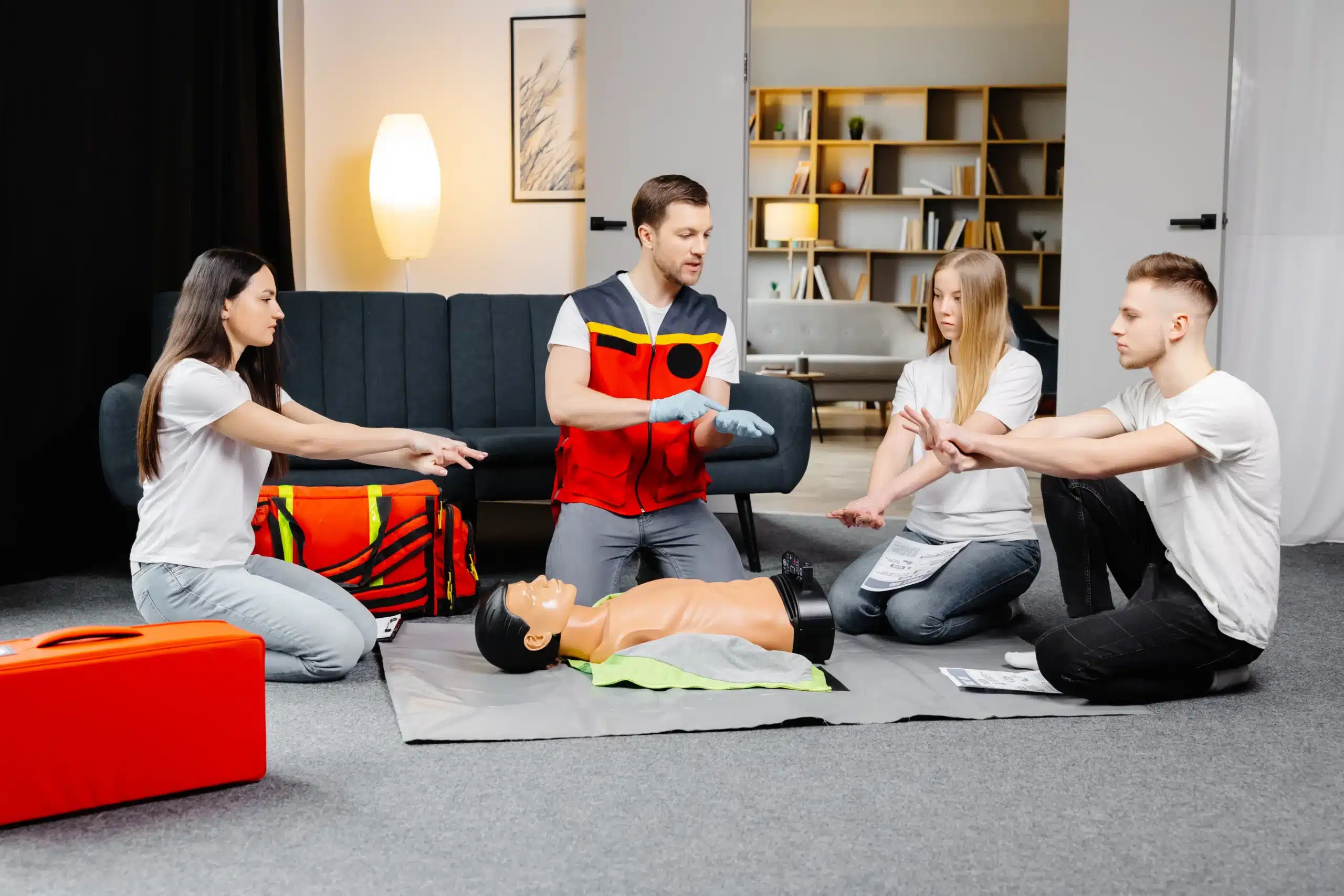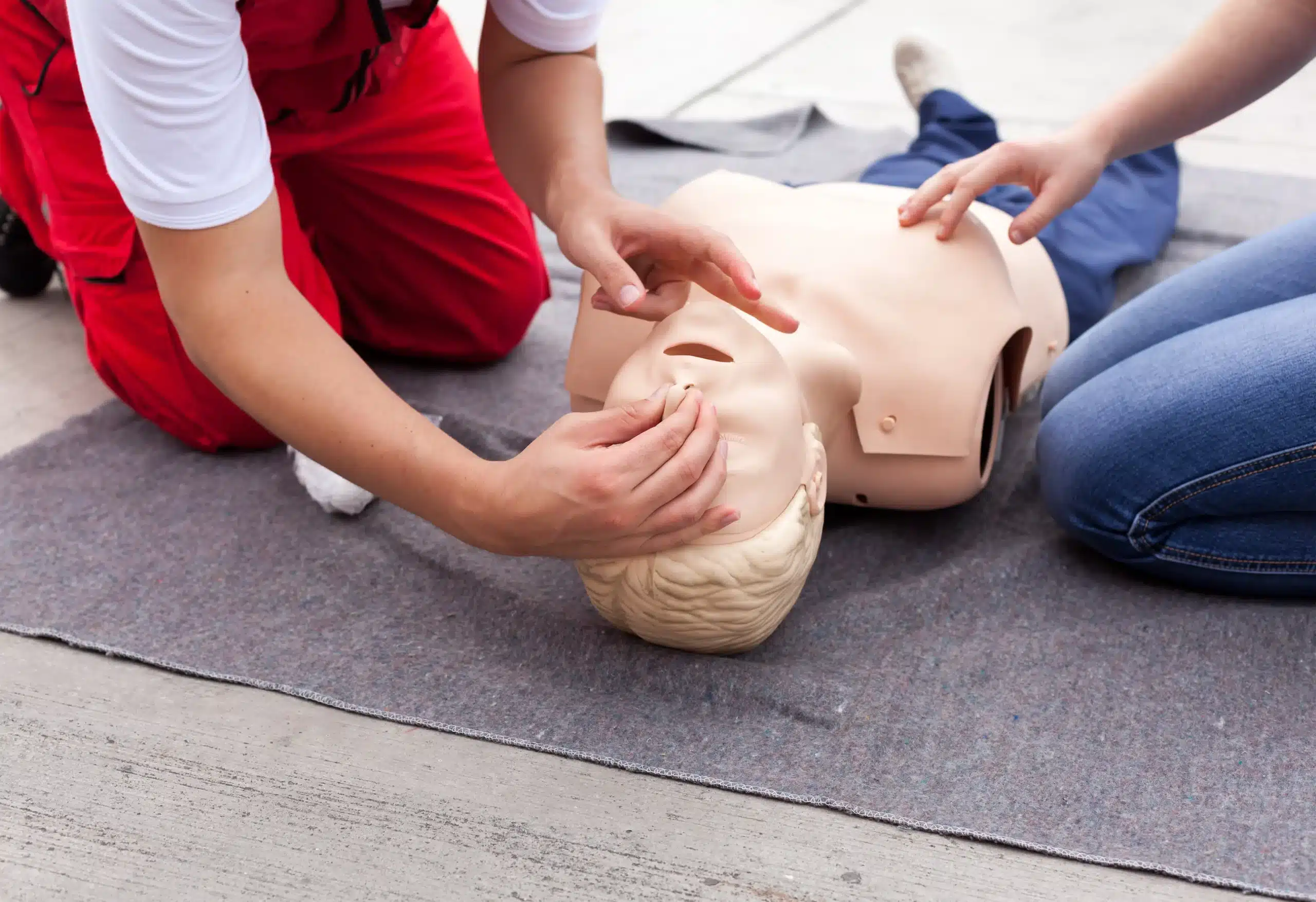Living in Napa and dreaming of a career in library and information science? Online BLIS classes in Napa offer a flexible path to achieving your professional goals without uprooting your life. This guide provides a comprehensive overview of online BLIS programs, covering everything from curriculum highlights and technical requirements to tips for thriving in the online learning environment. We’ll explore the advantages of online learning, including the flexibility to study at your own pace and the accessibility of online resources. We’ll also discuss the relevance of BLS certification, especially for those considering careers that bridge healthcare and information management. Whether you’re a recent high school graduate or a working professional, this post offers valuable insights into pursuing online BLIS classes in Napa.
Key Takeaways
- Invest in life-saving skills: CPR and first aid training empower you to respond effectively in emergencies. Find a reputable provider like Safety Training Seminars for convenient and affordable courses in Napa.
- Online learning fits your life: Gain valuable skills on your own schedule with the flexibility of online courses. Explore options that offer accessible learning platforms and self-paced study.
- Choose a program that supports your goals: Research program credibility, accreditation, and available resources to ensure it aligns with your needs. Consider providers like Safety Training Seminars, known for their commitment to quality training in the Napa area.
What are BLIS Classes?
What are BLIS Classes and Why are They Important?
A Bachelor of Library and Information Studies (BLIS) is an undergraduate program focused on library science and information management. These courses offer a deep dive into the world of organizing, accessing, and managing information. A BLIS degree provides a solid foundation for a career in libraries, archives, and other information-related fields. It’s relevant for anyone interested in working with information in a professional setting. This includes roles in academic libraries, public libraries, special libraries (like law or medical libraries), and even information management roles in businesses. For those interested in library and information studies, understanding the curriculum is a crucial first step.
Key Topics in a BLIS Curriculum
BLIS programs cover a broad range of topics, equipping students with both theoretical knowledge and practical skills. You’ll learn about cataloging and classification systems, which are essential for organizing library materials. Information retrieval and database management are also key components, teaching students how to find and manage information effectively. Many programs also explore digital libraries and archives, reflecting the increasing importance of technology in the field. You can expect coursework in information ethics and law, research methods, and collection development. Some programs also offer specializations, allowing students to focus on areas like archival studies or digital asset management. Many BLIS programs use a learning management system (LMS), providing students with access to online resources, projects, and a virtual library. These online BLIS courses offer flexibility for working professionals or those with busy schedules.
Where to Find Online BLS Classes in Napa
If you’re looking for online Basic Life Support (BLS) classes in Napa, you have several excellent options. Whether you’re a healthcare provider or someone wanting to learn essential life-saving skills, finding the right course is easy. Here are a few places to start your search:
Safety Training Seminars
Safety Training Seminars offers a variety of online courses, including BLS certification, designed for both healthcare professionals and the general public. Their flexible courses let you learn at your own pace, fitting training into your busy schedule. They focus on providing excellent customer service and competitive pricing for the Napa area.
Napa Valley College
Napa Valley College provides online education options, including courses that can prepare you for BLS certification. Their online platform is designed to be user-friendly and supportive, helping students achieve their learning goals. Check their website for specific course offerings and schedules.
American Heart Association Affiliated Centers
The American Heart Association’s RQI program is a popular choice for healthcare professionals seeking BLS certification in Napa. This program offers a modern and efficient path to certification, helping participants develop the skills needed for real-world emergencies. You can find more information about the RQI program and affiliated centers on the Safety Training Seminars website.
What Will You Learn in an Online BLIS Class?
This section clarifies what you can expect to learn in an online Bachelor of Library and Information Science (BLIS) program. While this post focuses on CPR and safety training in Napa, understanding the skills gained in a BLIS program can be helpful for those considering careers that combine healthcare and information management, such as patient educators or healthcare administrators. A strong foundation in information science can complement practical medical training.
Core Skills and Knowledge
Online BLIS programs equip you with foundational skills applicable to various library and information science roles. You’ll learn how to organize and manage information, conduct research, and analyze data. These programs cover topics like information retrieval, cataloging, and digital asset management. Developing these core competencies can be valuable even if you’re pursuing other healthcare-related certifications like those offered at Safety Training Seminars. For example, understanding information management can be crucial for maintaining patient records or conducting research in a medical setting.
Practical Training in a Virtual Setting
Many online BLIS programs offer practical training through a Learning Management System (LMS). These platforms provide access to projects, an online library, and additional learning resources. This hands-on experience allows you to apply your knowledge in a virtual setting, preparing you for real-world scenarios. Think of it like the hands-on component of a CPR class—you’re learning by doing, even in a virtual environment. Some LMS platforms even offer interactive simulations, similar to the training tools used in some RQI classes.
Certifications and Skills You’ll Gain
Online BLIS programs often follow a semester-based structure, providing a structured learning experience. Throughout the program, you’ll gain skills in areas like information literacy, digital preservation, and knowledge management. While a BLIS degree itself is a valuable credential, some programs also offer opportunities to earn additional certifications. These certifications can demonstrate your expertise in specific areas of library and information science, further enhancing your career prospects. Just as certifications like BLS and ACLS demonstrate proficiency in life-saving skills, certifications earned within a BLIS program validate your knowledge and skills in information management. You can find more information about these life-saving certifications on the Safety Training Seminars website.
How Much Do Online BLIS Classes Cost?
When considering an online Bachelor of Library and Information Science (BLIS) program, cost is a key factor. Understanding the expenses involved will help you budget effectively and explore financial aid options.
Tuition and Other Expenses
Tuition for online BLIS programs varies depending on the institution, program length, and resources included. Some universities charge a flat fee for the entire program, while others structure tuition per credit or semester. Generally, expect academic fees for a BLIS program to range between Rs. 9,000 and Rs. 15,000. Check with the specific program for the most up-to-date tuition information. Beyond tuition, factor in additional costs like application and graduation certificate fees.
Discounts and Financial Aid
Many universities offer financial assistance for online BLIS programs, including scholarships, grants, and loans designed for online students. Explore the financial aid options available through your chosen university. The flexibility of online learning often allows students to work while studying, helping manage program costs and balance professional and academic pursuits.
Why Take BLIS Classes Online?
Online BLIS classes offer a unique blend of convenience and focused learning, making them an attractive option for busy professionals and anyone balancing multiple commitments. Let’s explore some key advantages of choosing the online route.
Flexibility and Accessibility
One of the biggest draws of online learning is its flexibility. Online BLIS courses offer the freedom to learn from anywhere with a reliable internet connection. No need to commute to a physical classroom or adhere to rigid schedules. This makes online learning particularly appealing for those juggling work, family, or other obligations. You can study at your own pace and fit your coursework around your existing schedule. This model eliminates the need for on-campus orientations, meetings, or tests, as highlighted by the University of North Carolina Greensboro’s B.A. in Liberal and Interdisciplinary Studies program.
Learn at Your Own Pace
Online BLIS programs often follow a structured, semester-based approach, typically dividing the curriculum into two semesters. This framework provides a clear roadmap for your studies while still allowing for flexibility within each semester. You can revisit materials as needed and truly master the concepts before moving on. This self-paced learning, as described on distanceeducationschool.com, allows you to tailor the learning experience to your individual needs and learning style.
Interactive and Adaptive Learning
While online learning might bring to mind images of solitary study, many online BLIS programs incorporate interactive elements and adaptive learning technologies. These can include online discussions, virtual study groups, and personalized feedback from instructors. This interactive approach not only enhances engagement but also fosters a sense of community among online learners. As noted in an article about the BLIS course, online programs are designed to equip you with practical skills and knowledge applicable to various roles in the library and information science field, improving your career prospects.
Tech and Support for Online BLIS Classes
Online Basic Life Support (BLIS) classes offer flexibility, but they do require some technology. This section covers what you need to participate effectively in online BLIS training.
Hardware and Software Requirements
For a smooth online learning experience, you’ll need a reliable computer (like a laptop or desktop) or a tablet with a keyboard. This allows you to easily access course materials, participate in discussions, and complete any assignments. Make sure your operating system and web browser are current to avoid compatibility issues with the online learning platform. Some programs may require specific software, so check with your chosen provider, like Safety Training Seminars, for details.
Internet Connectivity
A stable internet connection is essential for online learning. A strong connection ensures you can stream videos, participate in live sessions, and access online resources without interruption. Consider a wired connection for greater stability, or if relying on Wi-Fi, ensure a strong signal in your study area. Check with your internet provider to confirm your connection meets the requirements of the online BLIS course. Online BLIS programs often divide the curriculum into semesters for a structured learning experience, so consistent access is key. More information on online BLIS programs can be found at Distance Education School.
Technical Support
Reliable technical support is crucial for online learners. Before enrolling in a course, inquire about the technical support offered. Look for programs that offer assistance with login issues, troubleshooting technical problems, and navigating the online learning platform. Knowing you have a support system in place can make your online learning experience much smoother. For more insights into effective online student support, check out these strategies.
How to Get BLS Certified
Getting your BLS certification is straightforward. It involves a few key steps, from finding the right course to passing the certification exam. Here’s a breakdown to guide you:
Steps to Certification
- Find a Training Provider: Start by researching various BLS training providers. While the American Heart Association and the American Red Cross are widely recognized, other reputable organizations offer excellent training. Look for providers that offer courses aligned with current industry standards. For those in Napa, California, Safety Training Seminars offers a range of BLS certification courses.
- Choose and Complete the Course: BLS courses blend theory and hands-on practice. Many providers offer a combination of online learning and in-person skills sessions. This blended learning approach lets you study the theoretical material at your own speed before demonstrating your skills in a practical setting. Consider your learning style and schedule when selecting a course format.
- Pass the Assessments: Once you’ve completed the coursework, you’ll need to pass both a written exam and a practical skills test. These assessments ensure you can perform BLS techniques correctly and confidently. Practice and preparation are key to successfully completing this step.
Renewal Requirements
Your BLS certification is typically valid for two years. To stay current and maintain your credentials, you’ll need to renew your certification. Here’s what that entails:
- Mark Your Calendar: BLS certifications expire, so note the expiration date on your card. Set reminders to begin the renewal process a few months in advance. This gives you ample time to complete the necessary steps without a lapse in your certification.
- Enroll in a Renewal Course: BLS renewal courses are designed to refresh your knowledge and skills. They cover any updates to guidelines and procedures, ensuring you’re always practicing the most effective techniques. Check with your original certifying organization or other providers for available renewal courses.
- Complete the Course and Assessment: Similar to initial certification, renewal involves completing the course and passing both written and practical assessments. This confirms your continued competence in providing BLS. Make sure to complete the renewal process before your current certification expires.
Choosing the Right Online BLIS Class
Finding the right online Bachelor of Library and Information Science (BLIS) program takes more than a quick Google search. It means carefully considering several key factors to ensure the program aligns with your career goals, learning style, and personal circumstances. This section will guide you through the essential aspects to evaluate when making your decision.
Factors to Consider
Think about what you want from your BLIS degree. Are you hoping to specialize in a particular area, like archival management or digital curation? Do you prefer a program with a strong practical component, or one focused on theoretical knowledge? Consider the program’s curriculum, learning format (synchronous or asynchronous), and the flexibility it offers. Your learning style plays a crucial role in online learning success, so choose a program that works for you.
Also, research the program’s admission requirements, including prerequisites and application deadlines. Evaluate the time commitment required and whether it fits your current work and personal responsibilities. Finally, think about your budget and explore the program’s tuition fees and any available financial aid.
Program Credibility and Accreditation
A program’s credibility is paramount when choosing an online BLIS class. Look for programs from reputable universities with a strong track record in library and information science education. Accreditation is critical, as it shows the program meets specific quality standards. Ensure the program holds accreditation from a recognized accrediting body, such as the American Library Association (ALA). ALA accreditation is often preferred by employers and can significantly impact your career opportunities. You can usually find accreditation information on the program’s website or by contacting the university.
Beyond accreditation, research the faculty’s qualifications. Look for instructors with extensive experience and expertise in the field. Their involvement in professional organizations and publications can indicate the program’s commitment to staying current with industry trends. Reading student reviews can also offer valuable insights. Resources like Distance Education School can provide helpful information on various online BLIS programs. By carefully considering these factors, you can choose an online BLIS program that sets you up for success.
Succeeding in Your Online BLIS Class
Online learning offers incredible flexibility, but it also requires self-discipline. Here’s how to thrive in your online BLIS class:
Create an Effective Study Environment
Just because you can take your online BLIS classes anywhere with decent internet access doesn’t mean you should. Treat your online coursework with the same respect you’d give an in-person class. Designate a quiet, organized study space free from distractions. This could be a corner in your home, a local library, or even a coworking space. Make sure you have comfortable seating, good lighting, and all the necessary materials, like textbooks and notebooks, within easy reach. A dedicated study area helps signal to your brain that it’s time to focus. Consider investing in noise-cancelling headphones or using a white noise app to minimize distractions.
Manage Your Time and Stay Motivated
Online BLIS programs often follow a semester-based structure, breaking the course content into manageable chunks. Use this structure to your advantage. Create a realistic study schedule that aligns with the semester’s timeline and your personal commitments. Break down large assignments into smaller, more achievable tasks. Regularly review your progress and adjust your schedule as needed. Staying organized and setting milestones will keep you motivated and prevent you from feeling overwhelmed. Don’t forget to celebrate your accomplishments along the way! Reward yourself for completing tasks or reaching milestones to maintain momentum.
Use Available Support and Resources
Take full advantage of the support systems offered by your online program. Reach out to instructors with questions about the material or assignments. Connect with fellow students online to discuss concepts, share notes, and form study groups. Many online programs offer access to tutoring services, writing centers, and academic advisors—don’t hesitate to use them. Academic guidance is crucial for understanding complex topics and achieving your learning objectives. Familiarize yourself with the Learning Management System (LMS) and explore the available resources, such as online libraries, project examples, and supplementary materials. These resources are there to help you succeed, so make them work for you. Consider setting up regular check-ins with a tutor or mentor for additional support and accountability.
Frequently Asked Questions
Is online BLS training as good as in-person training?
Online BLS training effectively covers the same core material as in-person classes. The key difference lies in the hands-on skills practice. While online courses often incorporate videos and simulations, in-person training allows for direct feedback from an instructor as you practice skills on a manikin. Many online courses address this by requiring an in-person skills assessment before issuing certification. Consider which learning style suits you best and choose accordingly.
How long does it take to get BLS certified?
The time commitment varies depending on the course format and provider. A blended learning approach, combining online coursework with an in-person skills session, can often be completed in a day or two. Fully online courses might offer more flexibility, allowing you to complete the material at your own pace, which could take a few days or weeks depending on your schedule.
What’s the difference between BLS and CPR?
BLS (Basic Life Support) is a broader term encompassing CPR (Cardiopulmonary Resuscitation) along with other essential life-saving techniques, such as using an AED (Automated External Defibrillator) and relieving choking. Think of CPR as one component within the larger framework of BLS.
How do I choose a BLS training provider?
Look for providers offering courses aligned with current industry standards, such as those from the American Heart Association or the American Red Cross. Consider factors like course format (online, in-person, or blended), cost, location, and schedule. Reading reviews from previous students can also offer valuable insights.
How often do I need to renew my BLS certification?
BLS certification is typically valid for two years. To maintain your credentials, you’ll need to complete a renewal course and pass the required assessments before your current certification expires. Check with your certifying organization for specific renewal requirements and deadlines.






